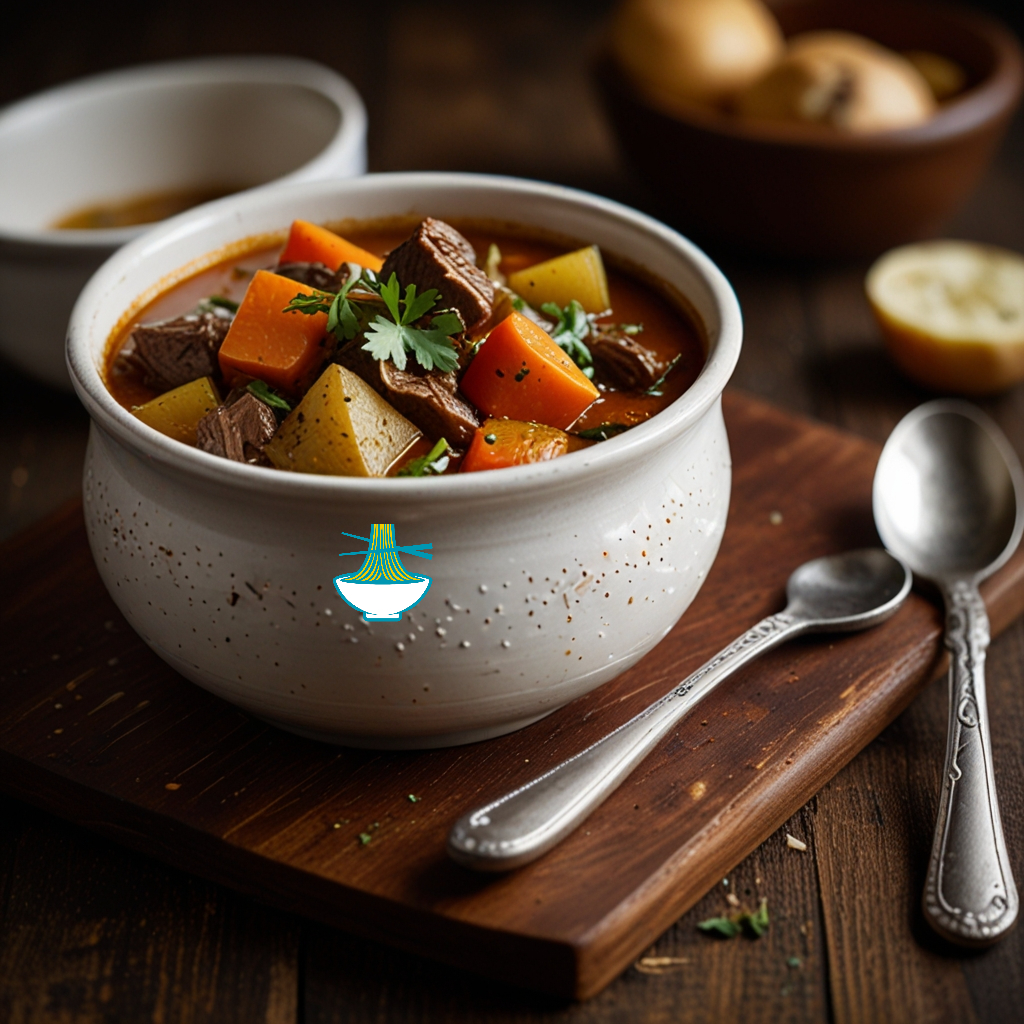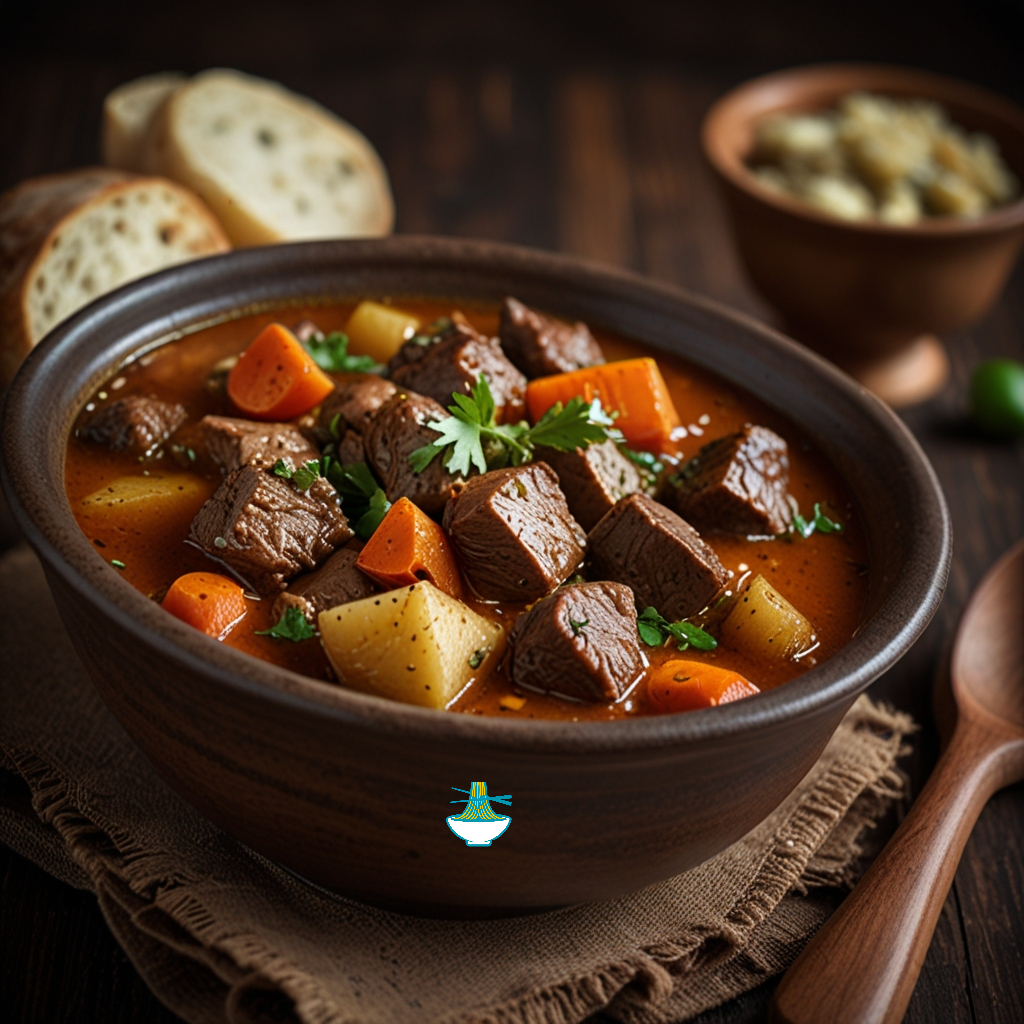Dimlama is a traditional Uzbek stew renowned for its hearty combination of meat, potatoes, and various vegetables, all simmered slowly until tender. The dish typically features lamb or beef, which infuses the stew with rich flavors as it cooks. Vegetables like carrots, bell peppers, tomatoes, and cabbage are common additions, layered with potatoes and seasoned with spices such as cumin, coriander, and black pepper. The slow cooking process melds the flavors together, resulting in a comforting and satisfying meal perfect for any time of the year.
Dimlama has deep roots in Central Asian cuisine, particularly within Uzbekistan. It is a quintessential dish of the region, reflecting the agricultural abundance and the nomadic heritage of its people. Traditionally prepared in a kazan, a type of cast-iron or aluminum cauldron, Dimlama is often cooked outdoors over an open flame, although modern adaptations allow for indoor preparation in a pot or slow cooker. The dish is associated with communal gatherings and celebrations, symbolizing hospitality and the sharing of food. Its enduring popularity is a testament to its simplicity, robust flavors, and the rich cultural tapestry of Uzbekistan.
Ingredients:
- 1.5 lbs (700g) lamb or beef, cut into chunks
- 4 large potatoes, peeled and chopped
- 3 carrots, sliced
- 2 bell peppers, chopped
- 3 tomatoes, chopped
- 1 large onion, sliced
- 1 small head of cabbage, chopped
- 3 cloves of garlic, minced
- 2 tablespoons vegetable oil
- 1 teaspoon cumin
- 1 teaspoon coriander
- Salt and black pepper to taste
- 1 cup water or broth
- Fresh parsley or cilantro for garnish (optional)
Method of Preparation:
1. Heat Oil: In a large pot or Dutch oven, heat the vegetable oil over medium-high heat.
2. Brown the Meat: Add the chunks of lamb or beef to the pot, browning them on all sides. This should take about 5-7 minutes. Remove the meat and set aside.
3. Cook the Vegetables: In the same pot, add the sliced onion and minced garlic, cooking until the onion becomes translucent. Then add the carrots, bell peppers, and tomatoes, cooking for another 5 minutes.
4. Layer Ingredients: Return the browned meat to the pot. Layer the chopped potatoes and cabbage on top of the meat and vegetables.
5. Season: Sprinkle the cumin, coriander, salt, and black pepper evenly over the layered ingredients.
6. Add Liquid: Pour the water or broth into the pot, ensuring it reaches about halfway up the layers of meat and vegetables.
7. Simmer: Bring the mixture to a boil, then reduce the heat to low. Cover the pot with a lid and let it simmer for about 1.5 to 2 hours, or until the meat and vegetables are tender.
8. Serve: Once cooked, stir the stew gently to combine. Garnish with fresh parsley or cilantro if desired, and serve hot.
This method ensures a simple, yet flavorful Dimlama that captures the essence of this traditional Uzbek stew.
Nutrition Value:
1. 1.5 lbs (700g) lamb or beef, cut into chunks
- Calories: 1200-1500
- Carbohydrates: 0g
- Protein: 160-180g
- Fat: 80-100g
- Sodium: 300-400mg
- Cholesterol: 450-600mg
- Vitamins: B12, B6, niacin
- Minerals: Iron, zinc, phosphorus
- Nutritional benefit: Rich in protein and essential amino acids, supports muscle growth and repair, provides iron for healthy red blood cells.
2. 4 large potatoes, peeled and chopped
- Calories: 520
- Carbohydrates: 120g
- Protein: 12g
- Fat: 0.4g
- Sodium: 28mg
- Cholesterol: 0mg
- Vitamins: C, B6
- Minerals: Potassium, magnesium
- Nutritional benefit: Good source of complex carbohydrates for energy, high in potassium which supports heart health.
3. 3 carrots, sliced
- Calories: 75
- Carbohydrates: 18g
- Protein: 1.5g
- Fat: 0.3g
- Sodium: 60mg
- Cholesterol: 0mg
- Vitamins: A (beta-carotene), K, C
- Minerals: Potassium
- Nutritional benefit: High in beta-carotene, supports vision and immune function, good source of fiber.
4. 2 bell peppers, chopped
- Calories: 60
- Carbohydrates: 14g
- Protein: 2g
- Fat: 0.5g
- Sodium: 6mg
- Cholesterol: 0mg
- Vitamins: C, A, B6
- Minerals: Folate, potassium
- Nutritional benefit: Rich in vitamins C and A, supports immune health and skin health, contains antioxidants.
5. 3 tomatoes, chopped
- Calories: 66
- Carbohydrates: 14g
- Protein: 3g
- Fat: 0.75g
- Sodium: 18mg
- Cholesterol: 0mg
- Vitamins: C, K, A
- Minerals: Potassium
- Nutritional benefit: High in lycopene, an antioxidant that supports heart health, provides vitamins C and K.
6. 1 large onion, sliced
- Calories: 60
- Carbohydrates: 14g
- Protein: 1.5g
- Fat: 0.2g
- Sodium: 6mg
- Cholesterol: 0mg
- Vitamins: C, B6
- Minerals: Chromium, manganese
- Nutritional benefit: Contains antioxidants and compounds that support heart health and reduce inflammation.
7. 1 small head of cabbage, chopped
- Calories: 200
- Carbohydrates: 48g
- Protein: 8g
- Fat: 1g
- Sodium: 80mg
- Cholesterol: 0mg
- Vitamins: C, K, B6
- Minerals: Calcium, potassium
- Nutritional benefit: High in fiber, supports digestion, rich in vitamins C and K for immune and bone health.
8. 3 cloves of garlic, minced
- Calories: 13
- Carbohydrates: 3g
- Protein: 0.6g
- Fat: 0g
- Sodium: 1.5mg
- Cholesterol: 0mg
- Vitamins: C, B6
- Minerals: Manganese, selenium
- Nutritional benefit: Contains allicin, supports immune function and cardiovascular health, has anti-inflammatory properties.
9. 2 tablespoons vegetable oil
- Calories: 240
- Carbohydrates: 0g
- Protein: 0g
- Fat: 28g
- Sodium: 0mg
- Cholesterol: 0mg
- Vitamins: E
- Minerals: None
- Nutritional benefit: Provides essential fatty acids, helps absorb fat-soluble vitamins, adds healthy fats to the diet.
10. 1 teaspoon cumin
- Calories: 8
- Carbohydrates: 1g
- Protein: 0.4g
- Fat: 0.5g
- Sodium: 2mg
- Cholesterol: 0mg
- Vitamins: A, C
- Minerals: Iron, calcium
- Nutritional benefit: Contains antioxidants, supports digestion, has anti-inflammatory properties.
11. 1 teaspoon coriander
- Calories: 5
- Carbohydrates: 1g
- Protein: 0.3g
- Fat: 0.2g
- Sodium: 1mg
- Cholesterol: 0mg
- Vitamins: C, K
- Minerals: Magnesium, manganese
- Nutritional benefit: Rich in antioxidants, supports digestion, may help regulate blood sugar levels.
12. Salt and black pepper to taste
- Calories: Minimal
- Carbohydrates: Minimal
- Protein: Minimal
- Fat: Minimal
- Sodium: Varies (sodium primarily from salt)
- Cholesterol: 0mg
- Vitamins: Minimal
- Minerals: Minimal
- Nutritional benefit: Enhances flavor, pepper contains antioxidants and anti-inflammatory properties.
13. 1 cup water or broth
- Calories: 0 (water), varies for broth
- Carbohydrates: 0g
- Protein: 0g
- Fat: 0g
- Sodium: Varies (higher in broth)
- Cholesterol: 0mg
- Vitamins: Minimal
- Minerals: Minimal
- Nutritional benefit: Hydrates the dish, broth can add flavor and nutrients depending on the type used.
14. Fresh parsley or cilantro for garnish (optional)
- Calories: 2
- Carbohydrates: 0.4g
- Protein: 0.2g
- Fat: 0.03g
- Sodium: 1mg
- Cholesterol: 0mg
- Vitamins: C, A, K
- Minerals: Iron, calcium
- Nutritional benefit: Adds fresh flavor, rich in vitamins C and K, contains antioxidants.


Comments